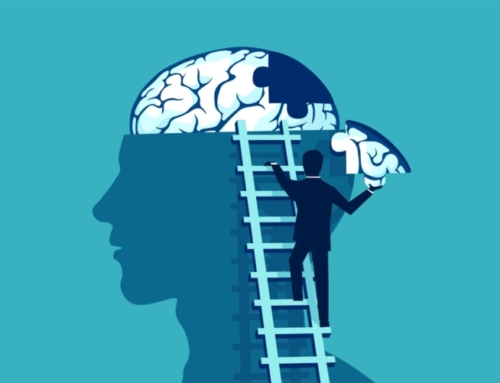Consider this Clinician-Patient Interaction:
Clinician: During our last meeting we focused on your feelings of low energy. When we investigated the possible contributors to that feeling, we discovered, surprisingly perhaps, that you felt worse when you were least active. The relationship was: the less you’re “out and about” on a particular day, the less energy you feel. We then came up with ways of tracking your activity level and associated level of energy, and ways of becoming more active in easy, every-day kind of ways. How did that go for you and what did you learn?
Patient: [Shrugs shoulders.] Not great. [Silent and looking out the window.]
Clinician: I see. I’m sorry to hear that. Tell me more so we can figure out what to do next.
Patient: Not much to tell. I tried being more active, but it didn’t make me feel better.
Clinician: I see. Can you be more specific so we can identify what to tweak to make this approach more effective?
Patient: [With irritation.] No. It’s stupid. I know my low energy has nothing to do with my activity level. It’s something else. I don’t want to keep talking about it. I want you to focus on my low energy… and just give me something to fix it!
Clinician: I believe we’ve both been quite focused on your energy level. Also, when we last spoke, it seemed like there really was a pretty clear relationship between low activity and low energy. I do think that there is more to it than that, of course. The low activity may be a sign – and a consequence – of a day that is devoid of fun activities, one that feels unstructured or even pointless to you. Maybe those are the underlying issues. I focused on activity because often just increasing one’s activity level decreases many associated problems: activity adds structure, purpose, and opportunities for doing fun stuff to a day. For example, if you’re indoors all day, chances are slim that you’ll run into friends and end up chatting with them and maybe more. Of course, I’m speculating. Do you care to comment on whether any of what I said resonated with you?
Patient: Not really. I just wish you would get your act together and fix this problem I’m having.
Clinician: I see. You are frustrated with me … with our efforts thus far. So, what do you recommend we do next?
Patient: You’re the professional. I’m paying you and not the other way around.
Clinician: Yes, you’re quite right about that. I had some very detailed recommendations for you. They seem not to have been effective or not tried – I can’t tell which because you didn’t tell me yet. So, I want to turn it over to you: what do you think should be our next step? What seems like a potentially good area for us to explore and possibly make changes to? I’ll be happy to chime in with any thoughts I have so we can work together to get to the bottom of what’s ailing you. How does that sound?
Patient: [Shrugs and keeps looking out the window again.]
Clinician: [Sits quietly, expectantly, with an inviting expression, but maintains silence, communicating non-verbally that the next words will need to be the patient’s.]
Over my career I’ve had many interactions that took this form: “Doctor fix me. The medicine you gave me didn’t work and made me feel worse. And the things you recommended I do were plain stupid.” As a clinician it’s hard not get upset by this kind of talk (and emotion) coming from a patient. The clinician’s reactions to this patient are common and normal but need to be recognized and not acted on in ways that would be counter-therapeutic to the patient’s welfare. For example, even as I was writing the words of the dialogue above, I felt like telling this patient, “Hey, I’m trying to help you, so don’t attack me. I came up with a very good plan for you that, clearly, you couldn’t be bothered to actually follow through on. If you don’t like my services, leave. I have plenty of other patients willing to take your spot!”
Those are strong and hurtful words, of course, and I would never utter them this way. So, the question confronting us is, “if not that, then what?” I am able to keep my irritation and disappointment with patients’ frequent lack of participation and blaming me by maintaining a certain understanding of the nature of my relationship with the patient. My implicit message to patients goes something like this:
“I’m your coach and guide. I strive to understand the nature of your problems and use my training to come up with possible solutions. These solutions may include medications, talk therapy, behavioral therapy, relationship and other advice, social service intervention, etc. No single intervention is guaranteed to work, but I promise to continue to work with you on different solutions for as long as you’re willing to work with me and stick to basis clinic rules.
“But if you don’t tell me things, then I won’t know about them. If you don’t follow through on assignments, then they are guaranteed not to work for you. If you don’t take the meds as I prescribe, they also won’t work for you. It’s in your interest to tell me what you think and feel to the best of your ability so I can brainstorm better approach with you. You don’t have to pretend with me. Whatever you might want to tell me, I’m sure I’ve heard worse.
You must know: there are many things I can’t do for you. My role is to help you –step-by-step – come up with and follow up on different interventions that we discover may or may not work. I can’t force you to do anything, though. Ultimately, everything you do or don’t do is up to you. I can and will cajole, provide evidence, use motivational techniques, and discuss and compromise but, ultimately, you will do what you will do and you will live with those consequences. Having said that, I look forward to working productively with you on these crucial aspects of your life.”
Of course, I have never explicitly communicated in toto such a manifesto to patients, but I have communicated parts of it to different patients at different phases of their treatment. It’s kind of a harsh message, but it is reality.
What I more often do is convey implicitly my view of my relationship with the patient. I did this in the above interaction between clinician and patient. There, I kept throwing the responsibility back at the patient by asking them what next step we should take or what they think we should focus on. I know patients are likely feeling alone, afraid, frustrated, sad, resentful, helpless, and/or hopeless, so I strive to be patient and kind when I convey such as message.
Ultimately, the only way for the patient to overcome their problems is for them to take responsibility for doing what needs to be done. This likely will be a difficult reality for a patient to accept and may require skills they may not yet have. So it is a journey of sorts for the patient. But if their fantasy remains intact that I can make it all better for them – like a parent once did for them or, more likely, a parent they never had but desperately wish they had might have done for them – then they will continue to suffer. The sad truth is I can’t hold them to my breast and tell them, “Everything will be alright. Daddy will fix it.” I’m left with doing the next best thing, giving them my undivided attention and ongoing efforts.
Until next time,
Dr. Jack
LanguageBrief
Today’s Quotes
“He has a right to criticize, who has a heart to help.”
– Abraham Lincoln
“One of the most important things you can do on this earth is to let people know they are not alone.”
– Shannon Adler
“No one is useless in this world who lightens the burdens of another.”
– Charles Dickens






Leave A Comment